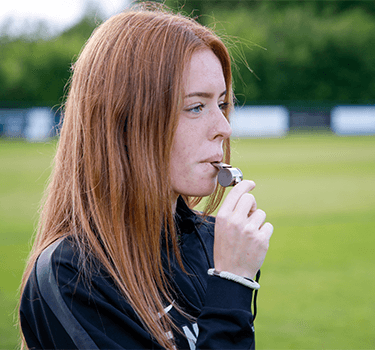
Time for a refresh
We’re currently updating our website, so you’ll soon see some changes as we make improvements.
Although the appearance may look different, rest assured that our products and services will not be affected.


Freya McKenzie is just 16 years old but she’s already a qualified referee and a player for XL@Football women’s club.
Having loved football from a young age she realised there was a lot more to the sport than just playing and wanted to explore different areas. So she decided she wanted to become a referee and a coach to help young players start their football career.
In her first year of refereeing (the 2020/2021 season) she won the grassroots match official of the year award from the Kent FA, which was a huge achievement. It’s something that will inspire other girls, to show them that it doesn't matter how old you are or what level you are at, you can always achieve your goal, and people will recognise the hard work you put in and the commitment you show.
As we approach the kick-off of the Women's EURO 2022 tournament we spoke to Freya to dig a little deeper into what made her want to become a referee, what challenges she’s faced and what advice she would give to young girls wanting to follow in her footsteps.
 Q: What made you want to become a referee/get into football?
Q: What made you want to become a referee/get into football?
From a very young age I’ve always had a huge love for football. I’d always sit and watch the games with my dad and then I decided that football was what I wanted to do. I've always loved playing football, not only with girls but training with boys, because there weren't many local girls’ teams around when I started. After playing for a while I decided I wanted to do more things within football so I decided to do the referee course.
Q: How and when did you first become a referee?
I became a referee at the age of 14, which was a difficult decision for me being a young girl. I did my course in January 2020, which consisted of a programme that lasted over two full days, an exam and a five-game practice where a qualified ref had to assess how I got on for my first couple of games. After passing my exam and finishing my five games I became qualified.
Q: How did it feel the first time you were on the pitch in front of a crowd?
When refereeing my first game I was very nervous and didn't want to go. However, after the encouragement from my family I went and completed my first game. After speaking to both managers I started to feel more comfortable and less nervous. For my first game I felt it went very well. I did have a big hurdle to face when I had the other team's linesman walk onto the pitch and start shouting at me. He told me the players were fighting even though they weren’t and was telling me I needed to sort it out. I politely asked him to leave and as he was leaving he threw the flag in my face and told me he was not going to be told what to do by a girl! It was nerve-wracking refereeing in front of parents; however, they were all very respectful and I had a lot of positive feedback especially about the way I handled the situation.
Q: In a sport mainly dominated by men how did you feel breaking into that?
When I started reffing I knew it would be a challenge being a young female in a male-dominated sport; however, I had completed my course and I knew the rules, meaning I had the same knowledge or even more than the others who had not completed a referee course.
There have been multiple occasions where parents have made comments about their ref being a girl and how they think I don't know what I'm doing, but without me or any other referee their son/daughter wouldn't be able to play their matches every week.
I believe that many parents judge referees, especially female referees, before they have even officiated the game. Many parents have commented on how the referee is a girl but then have come to me at the end of the game to thank me and say that I was the best referee they have had all season and I did a good job. Being a female in a male-dominated sport you’re judged before you’re even given a chance to show that you do know what you’re doing.
Q: How do you have the confidence to make difficult decisions and give yellow/red cards during a game?
When reffing you’re never able to make both teams happy, whatever decision you make you’ll always upset one team. But if you stick with your decision and don’t let others persuade you to change your mind you’ll become more confident. I think confidence starts when you’re doing the course, as it teaches you that you’re the referee so you’re the person who makes the decisions. Not everyone will agree with some of the decisions you make but as long as you’re happy that you’ve made the right choice then you know you’ve done your job. People will always try and get you to change your mind but you have to be consistent and stick with the first choice you make.
Q: What advice would you give to any young girls aspiring to be a referee in the future?
I say go for it! It may be scary at first but if it's something you want to do then always push yourself to do it. My biggest advice is confidence, to have the confidence to learn new skills and take on new challenges. To do what you want to do and not be persuaded by other people. People will always have their own opinions on what you do and although it’s important to listen to other people's opinions, always do what is best for you. There will always be people that judge you based on what you do but as long as you’re happy and comfortable that's all that matters.
If you make a mistake do not give up; mistakes will always be made but you have to learn from them and go again. It may take a few goes but you’ll always get there in the end.
Q: What qualities would you say are vital to be successful?
I think the main quality is confidence. Always have confidence in yourself and what you’re doing. To be motivated and push yourself towards your goals and make sure you reach them. To also set yourself goals that you may not think you can reach but by pushing yourself you can do whatever you put your mind to. Teamwork is also vital but so is working for yourself and knowing what’s best for you.
To reach your goals and to get far you can’t give up, you have to pick yourself and keep going even if there are challenges along the way. There will always be challenges you have to face. But these challenges are just different steps to help you reach your end goal.
Q: How do you engage and empower others?
I think the best way to do this is by telling people that it’s okay to take risks and try new things and to not be afraid when doing it. To let them know that if in the end it isn't what they want to do it gives them the confidence and reduces the risk of fear when it comes to doing it again. Life is about taking risks and not looking back on things that you wished you had done.
It's all about creating an environment where young girls especially can have a voice and where they can express their opinions and views on different things. And to also share their successes and achievements in a sport where they are seen as ‘less important’ than a male. To become a role model where the younger generation can relate to the role models past experiences and for them to have someone to look up to.
To try and inspire others I tell people about my experiences and the things I have achieved to show people that anything is possible if you have the right mindset. Not only that but to just show people that there are many different areas to football e.g., coaching, reffing and playing.
Q: Have you been inspired by any women, either personally or professionally?
I think my mum is a big inspiration. She always pushes me to reach my goals and helps me to go further than I expected. She always believes in me no matter what and always has confidence in me. She always stands by my side and helps me through whatever challenges I may face. She always inspires me to go for what I want and says if you put your mind to it nothing is impossible. She definitely inspires me to believe in myself and to always have confidence in myself even when I’m unsure. She always makes it known that it’s okay to make mistakes but you must never give up.
A professional inspiration for me I would say is Alex Scott. She’s always inspiring young girls to get into football and to always go for what you want.
Kent Reliance are proud sponsors of XL@Football, a player-centric professional football club for female players based in Kent. Find out more about them here.